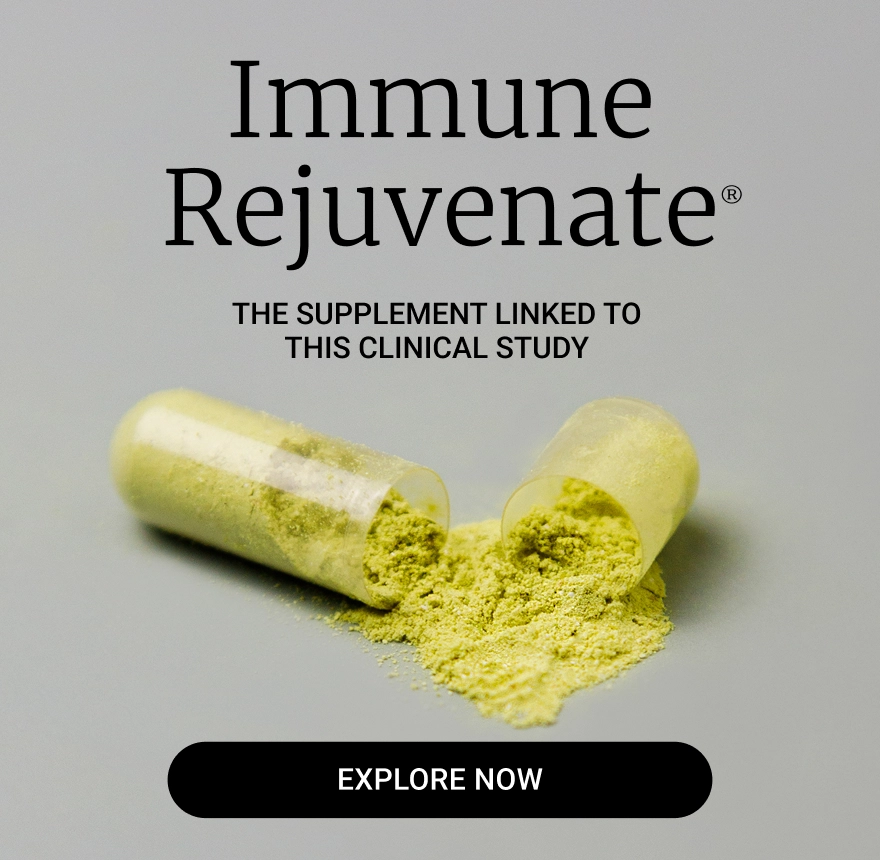Our Clinical Trial:
The HTB Longevity Study
The first clinical study exploring the effects of Tartary Buckwheat nutrients on immunity, longevity pathways and epigenetics.
Key Takeaways:
We found a 47% reduction in rate of aging in a group of people aging more rapidly.
We found across the entire study population, a dramatic 22x change in the ceramide kinase pathway which is related to longevity and immune aging.
We found an over 6x change in pathways related to COP9, a pathway linked to brain cell regulation and immune signaling.
We found significant changes in pathways specifically related to brain cells.
This research furthers our understanding of how food like Tartary buckwheat can impact human health through pathways related to immunity and aging.

As we age, changes in immune function can increase the risk of developing a host of issues impacting both lifespan and quality of life. Emerging research highlights how factors like diet, lifestyle, and environment can shape the immune system over time, influencing its performance and overall health through processes such as immunometabolism. One key mechanism? Epigenetic modification—changes in how genes are expressed without altering the DNA sequence itself.
Among the many dietary components influencing these processes, polyphenols stand out. These plant-based nutrients are found in a variety of foods, with certain sources offering unique concentrations and benefits. A noteworthy example is Tartary buckwheat (Fagopyrum tataricum), an ancient seed celebrated for its health-promoting properties. Packed with polyphenols, Tartary buckwheat holds promise for positively impacting immune health and longevity by acting on specific biological pathways.
In this pioneering pilot clinical trial published in Frontiers in Nutrition, a collaborative of researchers including Big Bold Health’s Dr. Jeffrey Bland and Dr. Austin Perlmutter explored the epigenetic effects of a standardized polyphenol concentrate derived from Tartary buckwheat. The trial involved 50 healthy participants (40% male, 60% female), aged 18–85, who consumed the concentrate daily for 90 days. Using advanced tools like epigenetic age clocks and immune cell analysis, the study revealed remarkable findings:


Epigenetic Age Improvements:
Significant changes were observed in multiple markers related to biological aging. In a subgroup of participants aging more quickly, there was a 47% reduction in speed of aging using an age measurement called PhenoAge which has an especially important relationship with immune aging.
Gene Pathway Activation:
Population-wide changes in gene pathways pointed to important effects on longevity and immune health. Most notable were changes in the ceramide kinase (CERK) pathway which had an over 22-fold change. This pathway is believed to play key roles in aging of the immune system.

Dr. Jeffrey Bland sees this study as a major step forward in nutritional research.

“I believe this study represents important work in furthering our understanding of how food can benefit our health and in particular our immune system. It also helps explain how cultures around the world have benefited from diets rich in plant foods like Tartary buckwheat for millennia.”
This research not only underscores pathways that may help explain the health effects of polyphenol-rich plants like Tartary buckwheat but also opens the door to further investigation into their role in promoting immunity and longevity. As Dr. Austin Perlmutter describes:

“We’ve long thought of polyphenols and other plant nutrients as only significant for their antioxidant capacity. This work indicates that there’s an entire world of fascinating pathways to discover showing how plants like Tartary buckwheat impact human health.”
By leveraging the natural power of historically consumed foods, this study contributes to a growing body of evidence supporting food as medicine, especially through effects on immunity. You can read the entire publication HERE.